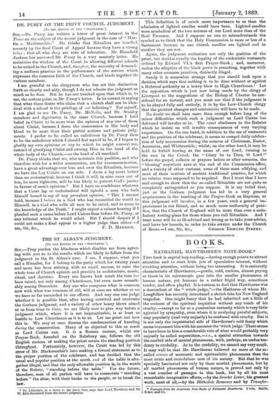DR. PUSEY ON THE PRIVY COUNCIL JUDGMENT.
(TO THE EDITOR OF THE "SPECTATOR.")
SIR,—Dr. Pusey has written a letter of great interest to the Times on the subject of the recent judgment in the case of "Martin v. Mackonochie." He thinks that Ritualists are handled severely by the final Court of Appeal because they have a strong belief ; that all who deny are sure of toleration. Mr. Blomfield Jackson has answered Dr. Pusey in a very masterly letter. He maintains the wisdom of the Court in allowing different schools to be united in the Church, and, therefore, the necessity of demanding a uniform practice in the performance of the service which expresses the common faith of the Church, and binds together its various members.
I am grateful to the clergyman who has set this distinction forth so clearly and ably, though I do not admire the judgment as much as he does. But he has not touched upon that which is, to me, the serious point in Dr. Pusey's letter. Is he correct in saying that what those desire who claim that a church shall not be identical with a school is the privilege of not believing ? For myself, I am glad to see Dr. Pusey, Dr. McNeile, and Dr. Stanley members and dignitaries in the same Church, because I hold belief in Christ to be more than the opinion of any one of them about Christ, because I deem the communion in His body and blood to be more than their partial notions and private judgments. I prefer to be called an unbeliever by Dr. Piney than to be the unbeliever which I should feel myself to be, if I began to glorify my own opinions or any to which he might convert me, instead of glorifying Christ and owning Him as the head of the whole body of the Church,—as the head of all mankind.
Dr. Pusey thinks that we, who maintain this position, and who therefore wish for a wider communion, not for excommunication, have a great advantage over him and over the Ritualists, because we have the Lay Courts on our side. I deem a lay court better than an ecclesiastical, because I think it will, in nine cases out of ten, be more righteous, will be less likely to pervert God's justice in favour of men's opinions.* But I have no confidence whatever that a Court lay or ecclesiastical will uphold a man who feels himself bound to say of any prevalent opinion, "This I cannot hold, because I believe in a God who has reconciled the world to Himself, in a God who wills all men to be saved, and to come to the knowledge of the Truth." I might expect a calmer hearing if I pleaded such a cause before Lord Cairns than before Dr. Pusey, or any tribunal which he would select. But I should despair if I could not make a final appeal to a higher judge than either.--I am, Sir, &c., F. D. MAURICE.










































 Previous page
Previous page